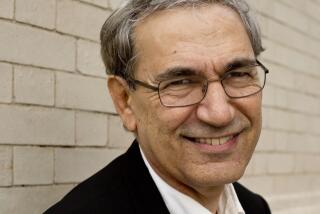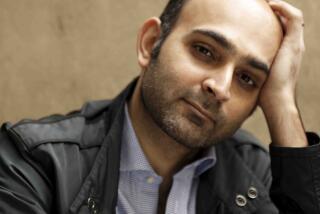THE 13TH HOUSE <i> by Adam Zameenzad (Random House: $15.95; 202 pp.) </i>
More accessible than “The Satanic Verses,” whose success suggests that negative publicity may be the best publicity of all, “The 13th House” is also a powerful and complex allegory about the sometimes-dangerous lure of Islamic fundamentalism. A Pakistani now living in England, Adam Zameenzad centers this novel around Zahid, a good yet naive young man struggling to lift his family out of lower-class life in Karachi, Pakistan’s former capital. Zahid first sees his job as the key to a better future, but when that proves to be a dead end, he places his hope in a new house he is able to buy cheaply because of rumors that it is haunted. Skeptical of fundamentalist fears and more “spiritualist” than “ritualist,” Zahid is initially able to dismiss the rumors. But when his daughter falls ill shortly after his family moves in, his skepticism fades and his hope finds yet a new home in Islam. Visiting a mosque, he feels a sense of “grace that seemed to start like a spark of latent electricity from his forehead as it touched the matting on the floor, then swept through his whole being in one huge tidal wave of gentleness.” Religion is to disappoint Zahid as well, however, when he falls victim to an orange-clad yogi named Shah Baba, a spiritual quack who pretends to cure Zahid’s daughter while his disciples “reluctantly accept” Zahid’s life savings.
Zahid occasionally seems too good and innocent to believe, for among those who must fend for themselves in the streets, hope usually co-exists by necessity with some degree of savvy opportunism, as Mira Nair illustrates so eloquently in “Salaam Bombay!,” her recent film about lower-class life in India. “The 13th House” is still quite successful, though, as a moving portrayal of the longing many Pakistanis feel for “a comforting, welcoming house made with the bricks of love,” and as a demystification of fundamentalism’s lure. With Shah Baba, Zahid felt “naked and free as a child. But complete freedom meant complete helplessness and Zahid felt utterly free. In search of security he had to create a despot.”
More to Read
Sign up for our Book Club newsletter
Get the latest news, events and more from the Los Angeles Times Book Club, and help us get L.A. reading and talking.
You may occasionally receive promotional content from the Los Angeles Times.






